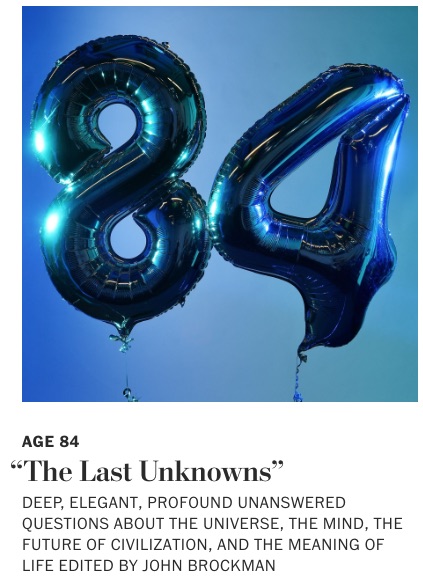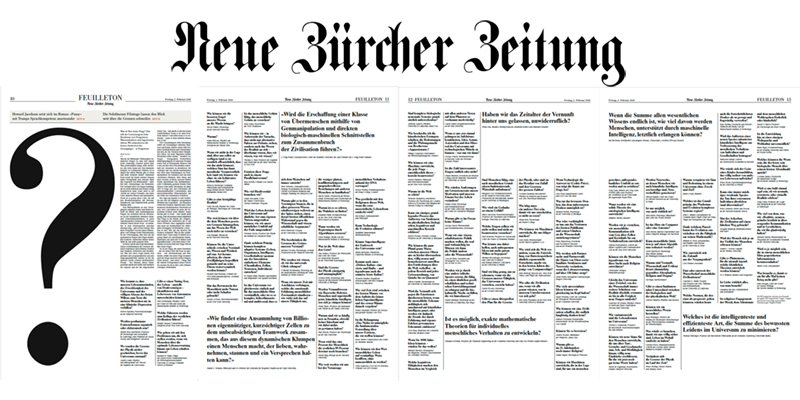
John Brockman, writer and editor, created a website called Edge (edge, or boundary) in which a conversation takes place between the academic world and an intellectually curious audience. That page was classified in the same category as magazines such as The New Yorker and The Economist. Brockman considered himself heir to the artist J. L. Byars, who last century organized a club of very diverse thinkers and said that to reach the edge of knowledge one had to ask others the questions they ask themselves.
Discussions in Edge could be collected today in a manuscript of more than ten million words. One of his initiatives was the annual publication of a book with various answers to a great question he asked. This year, to celebrate twenty years of the initiative (and to close it), Brockman decided not to ask a question, but to ask each participant for his, that last unknown that won't let him sleep. The book has more than 300 pages; each has only a brief question printed and the name of the one who asks it. Natural and social scientists, writers, artists and entrepreneurs participated.
Here are our picks for worthwhile books to read during each year of life, from 1 to 100, along with some of the age-appropriate wisdom they impart.

With time and wisdom to spare, there may be no better moment to ponder life’s big mysteries.

. . . 4. John Brockman, editor, The Last Unknowns: Deep, Elegant, Profound UNANSWERED QUESTIONS About the Universe, the Mind, the Future of Civilization, and the Meaning of Life. My nominated question was: “How far are we from wishing to return to the technologies of the year 1900?” NB: you get only the questions, not the answers. . . .

George Bernard Shaw once said, “There are those that look at things the way they are, and ask why? I dream of things that never were, and ask why not.” At the essence of Shaw’s quote lies the notion that questions matter. However, not all questions are created equal and in order to extract the most usefulness from it, the right question needs to be formulated. It’s a case of lock and key. The right question opens doors and allows people to explore what was once stowed away. The Last Unknowns (William Morrow) is a veritable treasure trove of these type of questions. . . .
The Last Unknowns is a loosely organized compendium of queries. One page, one question. Without any guidance, the topics meander but like a flâneur on the streets of Paris, aimlessly wandering but with the solitary purpose of discovery. They run the thematic gamut. . . .
So does The Last Unknowns provide any answers? Not in a single instance. That isn’t what the book was designed to accomplish. Does it get the mental wheels turning in directions they may never have done before? Absolutely. . . .

John Brockman's most recent book, The Last Unknowns poses this interesting question, what would be the question you would like to be reminded of: your last question?
This is how the world's brightest minds must respond . . . to this question from Brockman who is editor of edge.org, probably "the most intelligent place in the world" and through which, by a delicate process, the most creative minds were selected today, including the renowned curator of the City of Ideas, the Mexican Dr. Andrés Roemer, along with personalities such as Steven Pinker or the Israeli Dan Arely.
"Can you prove it?" is the question asked by Dr. Andres Roemer, a question that we also ask in many cases, with his speakers at the Festival of Creative Minds. . . .

John Brockman's Edge Question Series books have been fascinating to follow for over a decade now. With titles like This Explains Everything: Deep, Beautiful, and Elegant Theories of How the World Works, What We Believe but Cannot Prove: Today's Leading Thinkers on Science in the Age of Certainty, The Universe: Leading Scientists Explore the Origin, Mysteries, and Future of the Cosmos, and What Should We Be Worried About?: Real Scenarios That Keep Scientists Up at Night, the series clearly doesn't shy away from big questions—and there are so many more like that asked in the series, which has sold over a million copies.
The Last Unknowns: Deep, Elegant, Profound Unanswered Questions about the Universe, the Mind, the Future of Civilization, and the Meaning of Life, the conclusion to the series, hits bookstore shelves today. Being the last of the series, it is fitting that it leaves us with some of today's great thinkers' last questions. ...
Below, we have the introduction to the book, written by another of today's great minds—the author of Thinking, Fast and Slow—Daniel Kahneman. In it, he talks about what makes the series, and the site that it spawned from, so special.

This summer’s nonfiction releases range from the intriguing to the empowering, and every one is utterly engrossing. Here are our recommendations of the top nonfiction books arriving this summer — reads that will transport you to the mysterious depths of the ocean, place you in the middle of history, and take you on powerful inner journeys. Publishers’ descriptions included below.
1. The Last Unknowns, edited by John Brockman
This is a little book of profound questions — unknowns that address the secrets of our world, our civilization, the meaning of life. Here are the deepest riddles that have fascinated, obsessed, and haunted the greatest thinkers of our time, including Nobel laureates, cosmologists, philosophers, economists, prize-winning novelists, religious scholars, and more than 250 leading scientists, artists, and theorists. In The Last Unknowns, John Brockman, publisher of Edge.org, asks “a mind-blowing gathering of innovative thinkers” (Booklist): “What is ‘The Last Question,’ your last question, the question for which you will be remembered?”

John Brockman has run out of questions. Brockman, a literary agent, runs the science and philosophy site Edge.org. Every year for 20 years, he has asked leading thinkers to answer a particular question, such as: “What questions have disappeared?” or: “What do you believe is true even though you cannot prove it?” This year, though, Brockman announced that he has no more questions left. So he asked his final question: “What is the last question?”
“Judge a man by his questions rather than by his answers,” Voltaire insisted. Questions help us define what we don’t know and force us or others to justify what we think we do know.
Asking questions is relatively easy. Asking good questions is surprisingly difficult. A bad question searches for an answer that confirms what we already know. A good question helps to reset our intellectual horizons. It has an answer that we can reach, yet unsettles what we already know. ...
The questions of how science and technology are transforming life and society are among the greatest intellectual challenges that surprisingly few of today's intellectuals take on. One of the first to do so was FAZ editor Frank Schirrmacher, who died in 2014. So it was not only an gesture of respect, but also an attempt at a programmatic continuation, when the publisher of the weekly Freitag, Jakob Augstein, dedicated a symposium on digital debate to Frank Schirrmacher. . . .
If you want to get an idea of where the future debates are headed, we recommend the internet forum edge.org, directed by the science impresario John Brockman, who had always been an important source for Schirrmacher. For the last twenty years, Brockman has posed an annual question to his network of visionaries, artists, and Nobel laureates. This year, he ended the project by asking everyone to ask one last question.
When the biologist David Haig asks: "What will be the use of 99% humanity for the 1%?", he still poses a question aimed at current digital changes of in society. But if the anthropologist Dorsa Amir asks “Are the simplest bits of information in the brain stored at the level of the neuron?” or the roboticist Rodney Brooks asks, “Can consciousness exist in an entity without a self-contained physical body?”, we realize that science is thinking a lot more about the subject of artificial intelligence. That's why the result is one of the most exciting reading streams ever. Which brings us full circle back to Schirrmacher.

It is a question to inspire the individual – to quote Kant one last time – with "admiration and awe." The last question is always a question about last things. These last – and first – things are the true protagonists of the following pages. They will pursue you into your dreams and nightmares. Hopefully.

John Brockman has run out of questions, and it’s a shame. For 20 years, as a sort of homage to his late friend, the conceptual artist James Lee Byars, who in 1968 started “The World Question Center,” Brockman has been posing an “Annual Question” to some of the sharpest minds in the world, many of them scientists. Reviewing what might be a representative sample—“What is the most important invention in the past 2,000 years?”, “What do you believe is true even though you cannot prove it?”, and “What scientific idea is ready for retirement?”—it’s clear what Brockman wanted from his responders: to be intellectually daring, vulnerable, and contentious. Which is fitting, given the motto of Brockman’s website, Edge.org, to which the responses are posted: “To arrive at the edge of the world’s knowledge…”
Since 1998...the editor John Brockman has asked these questions on his Edge page ( www.edge.org ) to a hundred long intellectuals...
Brockman...says he has run out of questions and this year he has launched the last one. The question is, obviously: What is the last question? A chrysanthemum is the flower that Katinka Matson has chosen for her ritual illustration. There are many answers to look for. This is from Ryan Mckay , a psychologist at the University of London: "Will we be one of the last generations to die?" Of Robert Sapolsky, neuroscientist at Stanford: "Given the nature of life, the purposeless indifference of the universe and our absolute lack of free will, how is it possible that most people are not clinically depressed?" But the best last question, of a Leibnizian nature, is that of the MIT physicist Frank Wilczek. Given its monumental size it is understandable that answering it can never be among the obligations that a newspaper has contracted with the news.
Why?
















